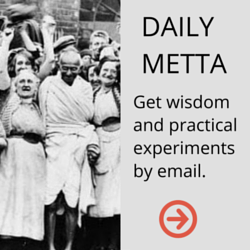July 3:
 “The extension of the law of nonviolence in the domain of economics means nothing less than the introduction of moral values as a factor to be considered in regulating international commerce.”
“The extension of the law of nonviolence in the domain of economics means nothing less than the introduction of moral values as a factor to be considered in regulating international commerce.”
–Gandhi (Young India, December 26, 1924)
Morality in economics sounds like an oxymoron. I can just hear it: leave morality to your religion, if you have one, and stay out of my pocketbook. But consider the boycott: it is a tool to regulate economics along the lines of moral values: we will not buy your products if you exploit labor, or use poisons or GMOs to produce it. Getting morality into economics is a challenge, but it’s not such a far fetched idea: we should all be intrigued by the question, what economics would look if like moral values were not an afterthought, a reason for protest, but a guideline and a point of departure. Where better to begin than with happiness? Not pleasure, mind you, but the abiding happiness that comes from having done something that helps another, that fulfills our purpose.
The Kingdom of Bhutan was the first to experiment with this new model of “business as usual” when they introduced the Gross National Happiness Index as an alternative to the supposedly value-neutral Gross National Product. Launched in 1972 as an effort to integrate primarily Buddhist spiritual values into their national vision, it spearheaded what is known as the “happiness movement,” with results such as the United Nations including “happiness” as a key value in their global development agenda in 2011 and ripples across other nations, including areas within the United States, Egypt, India, the United Kingdom and South Korea.
Gandhi was on to this idea early (as usual). Wouldn’t nonviolence be a key indicator of how happy we are? And with advertisement after advertisement trying to sell us an idea of happiness through consumption and even violence, would not a real indicator system tell us whether all of that “stuff” and all of that money, and all of that violence is really making us happy? It’s time we measured wealth where it really resides.
Experiment in Nonviolence:
What indicators would you include in your own version of measuring happiness? Where do you place your life on that scale?
 Daily Metta 2015, a service of the Metta Center for Nonviolence, is a daily reflection on the strategic and spiritual insights of Mahatma Gandhi in thought, word and deed. As Gandhi called his life an “experiment in truth,” we have included an experiment in nonviolence to accompany each Daily Metta. Check in every day for new inspiration. Each year will be dedicated to another wisdom teacher.
Daily Metta 2015, a service of the Metta Center for Nonviolence, is a daily reflection on the strategic and spiritual insights of Mahatma Gandhi in thought, word and deed. As Gandhi called his life an “experiment in truth,” we have included an experiment in nonviolence to accompany each Daily Metta. Check in every day for new inspiration. Each year will be dedicated to another wisdom teacher.








